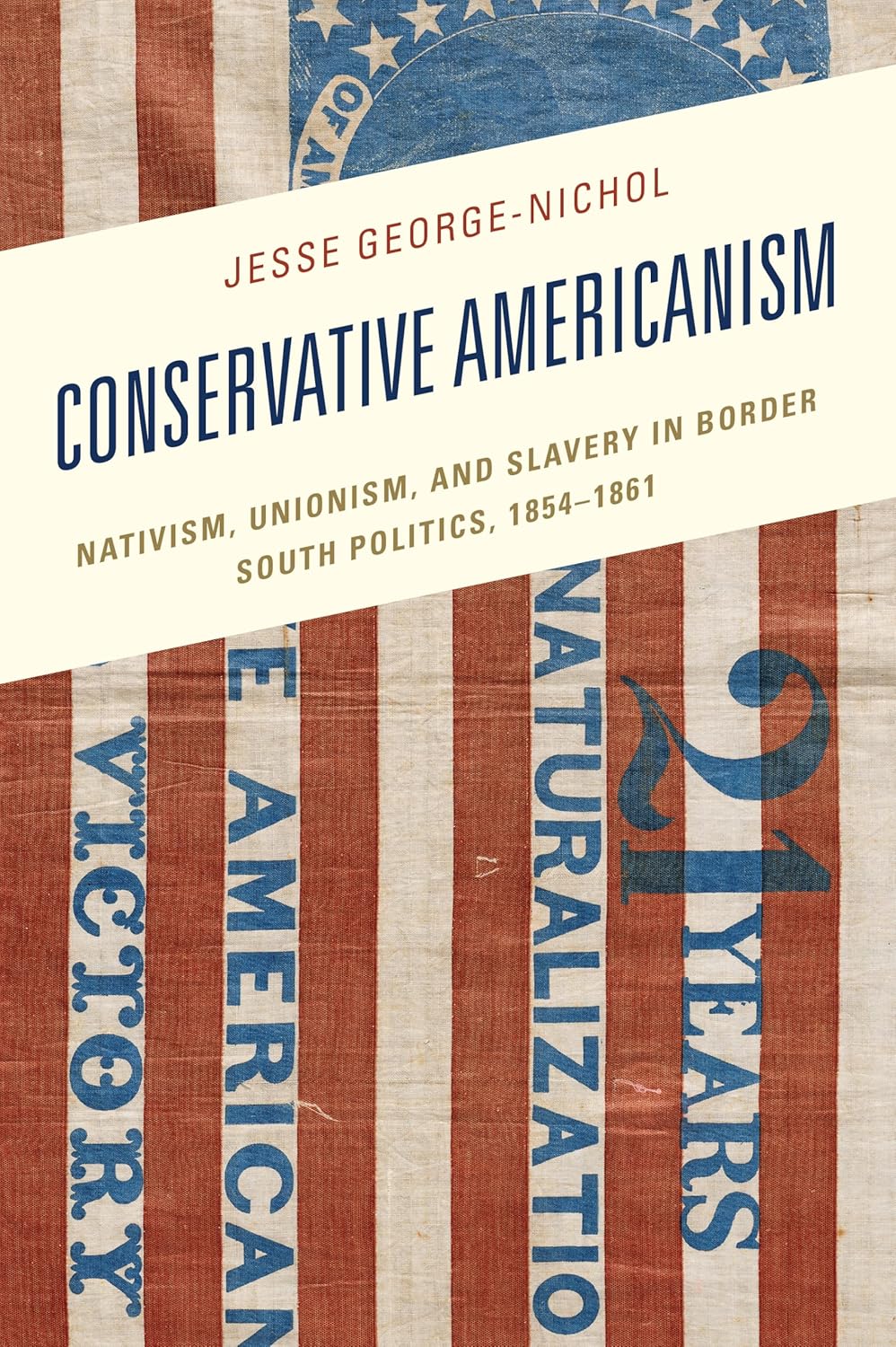Book Review: Conservative Americanism: Nativism, Unionism, and Slavery in Border South Politics, 1854-1861

 Conservative Americanism: Nativism, Unionism, and Slavery in Border South Politics, 1854-1861. By Jesse George-Nichol. Lanham, MD: The Rowman & Littlefield Publishing Group, Inc., 2024. Hardback, 312 pp. $130.00.
Conservative Americanism: Nativism, Unionism, and Slavery in Border South Politics, 1854-1861. By Jesse George-Nichol. Lanham, MD: The Rowman & Littlefield Publishing Group, Inc., 2024. Hardback, 312 pp. $130.00.
Reviewed by Riley Sullivan
During the antebellum period prior to the American Civil War, sectionalism increasingly defined the arguments of politicians of this era. When looking at such arguments, it is easy for one to surmise that few, if any, efforts were made to stem the inevitable tide of civil war.
However, Jesse George-Nichol–a postdoctoral fellow at the John L. Nau III Center for Civil War History at the University of Virginia–documents in her recent work Conservative Americanism: Nativism, Unionism, and Slavery in Border South Politics, 1854-1861, that an emerging conservative movement looked to trump radicals leading the sectional crisis. By focusing on a growing “Conservative Americanist” ideology in the border South, George-Nichol presents an engaging narrative that provides insights into a long neglected political movement.
According to George-Nichol, the border South witnessed the birth of what she describes as a “conservative Americanist” ideology that attempted to promote the cause of Union in response to the growing sectional divide of the 1850s. She described this ideology as championing moderation and compromise as the American tradition; while also seeing “the issues of nativism and Unionism [as] utterly inseparable.” (10) For these border South Americanists, “foreignism” was the root source to the radicalism of the 1850’s; and therefore, the principal threat to the Union. Additionally, she argues that the proslavery consensus of this faction was crucial to their embrace of nativism, as they sought to maintain the union as it was under the conditions of the Missouri Compromise of 1820.
It is through this argument that George-Nichol challenges the existing historiography on the Southern Know-Nothings. Largely, the literature surrounding the subject has often neglected the Know-Nothing movement of the South as attempting to use nativist arguments to distract from the slavery issue. Furthermore, many historians have failed to pay considerable attention to Southern Know-Nothings, as this movement was viewed as subordinate to their Northern counterparts. However, George-Nichol counters these arguments and demonstrates how Conservative Americanism played a crucial role in the shaping of the American Party in the Border States.
To focus on the evolving arguments of the Conservative Americanists, George-Nichol focuses on the writings and political arguments of six individuals that would shape its movement: John J. Crittenden, George Prentice, William G. Brownlow, John Bell, Alexander H. H. Stuart, and Robert Ridgeway. Drawing largely on their personal correspondence, speeches, newspaper articles, and other writings, Nichol-George recounts the development of this movement in the three border South states of Tennessee, Kentucky, and Virginia.
Dividing her work into seven chapters, George-Nichol begins her narrative with the explosion of the Conservative Americanist ideology following the passage of the Kansas-Nebraska Act. With the crisis that followed, many within the border South began to worry that increased radicalism in the North was a result of foreign influence. As a result, Conservative Americanists with their arguments surrounding nativism and compromise attracted many Southerners–including former Whigs–in the border South to their cause. Finding a home in the American Party, Conservative Americanists had reinvigorated voters in the Virginia gubernatorial election and state elections in both Tennessee and Kentucky in 1855.
Despite these strong showings, Conservative Americanists failed to become a national movement as the American Party’s national convention was highlighted by sectional divide. This fracture ultimately led to the lackluster performance of the American Party candidate, Millard Filmore, in the presidential election of 1856. Largely, George-Nichol credits their defeat to their failure to take a firm stance on the slavery question. As a result, Conservative Americanists had to reorient their arguments and “placed a greater emphasis on the Unionists rather than the nativist aspects of their message.” (121) Ultimately, this would culminate in the formation of the Constitutional Union Party. However, even as they abandoned their nativist rhetoric, they still identified radicalism as something alien to American political thought.
While the border South united under this banner in the election of 1860, it did not prevent the election of Abraham Lincoln. With several of the Gulf states beginning their steps to break apart the Union, Conservative Americanists like John J. Crittenden attempted final efforts to bring about compromise. These efforts failed to materialize, and this movement began to collapse. However, even with the collapse of this movement, through four years of bloody Civil War, the Union would be preserved.
While Conservative Americanism does much to advance the topic of the Southern Know-Nothing movement, this work does present some limitations. Further examination of rank-and-file Conservative Americanists can bring additional understanding of this political movement. Along with this, the author could also examine more deeply other trends that developed with Know-Nothingism in other Southern states. Despite such limitations, Conservative Americanism proves to be an excellent work, documenting the role of nativist arguments in the pursuit of compromise during the tumultuous period of the sectional crisis.
Riley Sullivan is a Professor of History at San Jacinto College in Pasadena, Texas. He received his Master of Arts in History (2021) from Sam Houston State University in Huntsville, Texas. Professor Sullivan published “The Battle for the Historical Record” in the Spring 2023 issue of the Tennessee Historical Quarterly.
“emerging conservative movement looked to trump radicals ” Interesting coincidence